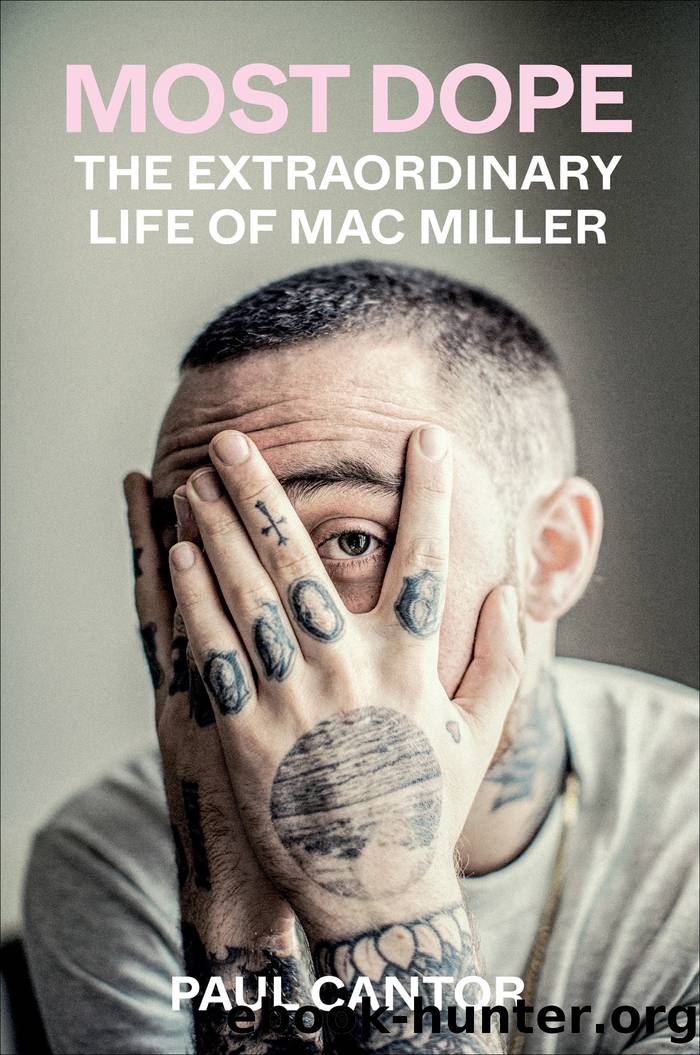Most Dope by Paul Cantor

Author:Paul Cantor
Language: eng
Format: epub
Publisher: Abrams
Published: 2022-01-18T00:00:00+00:00
TWELVE
Malcolm was depressed.
It was December 8, the day before the last show on the Blue Slide Park Tour. Heâd played the venue, Stage AE, a year earlier, opening for Wiz Khalifa. Back then, boos and cheers greeted him. The crowd was not yet completely sold on the young rapper.
Now he was back, a different artist, a different man. There was KIDS, then the videos with millions of YouTube views, Best Day Ever, âDonald Trump,â the On and On and Beyond EP, the mixtape I Love Life, Thank Youâbetter still, more than two hundred shows and a number one album, Blue Slide Park, under his belt.
Nobody could fuck with Malcolm. Or so he thought.
In the weeks after Blue Slide Park was released, reviews began trickling out. Some were good. But many were bad. Really bad.
In a review for XXL, Neil Martinez-Belkin wrote: â. . . the jury is still out whether heâll pursue an artistic vision, or ride out the Jonas Brothersâesque commercial appeal.â
Chuck Eddy at Rolling Stone said: âWhite rapper from the Rust Belt conquers the worldâsound familiar? Pittsburghâs Mac Miller, the Wiz Khalifa labelmate whose debut LP has already topped the album charts, is no Marshall Mathers.â
And Phillip Mlynar at SPIN derided the record completely, writing: â. . . Mac Millerâs Blue Slide Park suggests what would happen if the cast of Glee tried to make a rap album.â
Each review stung in its own way, but then there was the granddaddy of them allâPitchforkâs.
âWhen I started out, it was about really laying into people who really deserved it,â the siteâs founder, Ryan Schreiber, told the Washington Post.1 âIf it gets sacrificed or tempered at all for the sake of not offending somebody, then what we do sort of loses its value. . . . Thatâs so the opposite of what criticism is supposed to be.â
By the time Malcolm was ascendant, the site was, according to the New York Times, âthe most prominent brand in online music journalism.â So Malcolm sat there, captivated, reading their review of Blue Slide Park.
And Pitchfork absolutely hated it.
âThe reason Millerâs mass of fans follow him is not because of his music, at least not completely,â Jordan Sargent wrote in his review. âItâs because he looks just like them, because they can see themselves up on the stage behind him, if not next to him.â
Pitchfork was rejecting not only Malcolmâs music, but the very idea of Malcolm himself.
âHe is an outsider, but he brings no outsiderâs perspective to his music,â the review continued. â. . . [Heâs mostly just a crushingly bland, more intolerable version of Wiz Khalifa without the chops, desire, or pocketbook for enjoyable singles.â
If you were white, Sargent arguedâa âfrat rapper,â as Malcolm had been dubbedâyou could co-opt hip-hopâs attitude and slang, saw off its rough edges, and cash in with a young, ostensibly white, pop-leaning audience who didnât know any better.
The albumâs final score: 1.0.
Malcolm was distraught. To him, Blue Slide Park wasnât just an album, it was home. And Pitchfork had taken a flamethrower to it.
Download
This site does not store any files on its server. We only index and link to content provided by other sites. Please contact the content providers to delete copyright contents if any and email us, we'll remove relevant links or contents immediately.
| Classical | Country & Folk |
| Heavy Metal | Jazz |
| Pop | Punk |
| Rap & Hip-Hop | Rhythm & Blues |
| Rock |
Cecilia; Or, Memoirs of an Heiress — Volume 2 by Fanny Burney(31933)
Cecilia; Or, Memoirs of an Heiress — Volume 3 by Fanny Burney(31925)
Fanny Burney by Claire Harman(26591)
We're Going to Need More Wine by Gabrielle Union(19028)
Plagued by Fire by Paul Hendrickson(17398)
All the Missing Girls by Megan Miranda(15915)
Cat's cradle by Kurt Vonnegut(15320)
Bombshells: Glamour Girls of a Lifetime by Sullivan Steve(14046)
For the Love of Europe by Rick Steves(13845)
Leonardo da Vinci by Walter Isaacson(13303)
4 3 2 1: A Novel by Paul Auster(12362)
The remains of the day by Kazuo Ishiguro(8961)
Adultolescence by Gabbie Hanna(8908)
Note to Self by Connor Franta(7663)
Diary of a Player by Brad Paisley(7542)
Giovanni's Room by James Baldwin(7313)
What Does This Button Do? by Bruce Dickinson(6193)
Ego Is the Enemy by Ryan Holiday(5406)
Born a Crime by Trevor Noah(5367)
